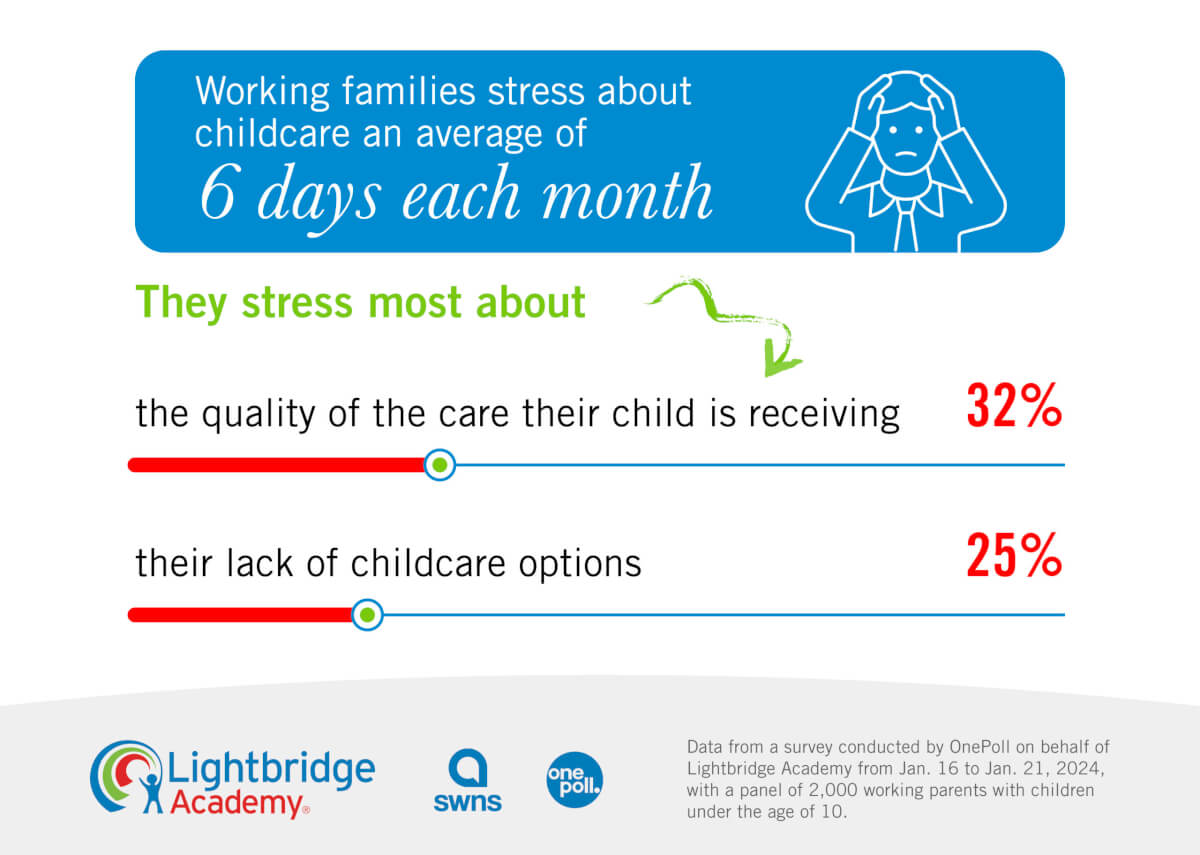NEW YORK — When it comes to raising a child, it’s an all-hands-on-deck affair — with the average working parent relying on six different people to support their child’s growth and development.
That’s according to a survey of 2,000 working parents of children under the age of 10. Family members such as their child’s grandparents (46%), extended family including aunts, uncles, and cousins (27%), and siblings (26%) are all part of their “village.” For some, best friends (17%) and neighbors (8%) also make the list.
This network even extends beyond parents’ inner circle, as they’re also looking to their child’s teachers (47%) and the faculty at their child’s school or daycare (33%) for support. On average, children spend four days a week with their support system, though 16 percent of working parents say they depend on them every single day of the week.
The research, conducted by OnePoll on behalf of Lightbridge Academy, finds that 29 percent of working parents still feel they need a second version of themselves to get by and 36 percent could use an even larger village. This may be because the average working parent stresses about childcare six days each month.
Almost one-third (32%) worry the most about the quality of the care or education their child is receiving. Interestingly, dads stress more than moms about communicating with their child’s caregivers on their progress (29% vs 17%). However, a similar number (25%) of all working parents fret most about their lack of childcare options.
More than one-third (36%) of all working parents surveyed cited being impacted by the “childcare cliff,” or the abrupt end to the American Rescue Plan Act of 2021, which is funding that kept thousands of childcare programs afloat nationwide.

Those parents have been faced with increased costs (50%), daycare layoffs and low staffing (31%), and closures (26%). Others adjusted their working hours to accommodate the availability (36%) or were forced to leave their job entirely (22%). Overall, 53 percent admit that their stress levels keep them from being the parent they want to be.
“It’s no secret that thousands of families are teetering on the edge of the childcare cliff,” says spokesperson Gigi Schweikert, CEO at Lightbridge Academy, in a statement. “Working families are already walking a fine line and barriers like this can have a huge influence on their work and personal lives. While the answer is beyond an individual employer, childcare center, or family, it’s up to all of us to speak up, advocate for our needs, and communicate challenges so that each working family is empowered to choose the solution that works best for them.”
Over the last year, working parents say they have missed three different social or professional events due to lack of childcare. The sacrifices of juggling work and home don’t stop there; working parents have also missed some of their child’s events, such as sporting events or recitals (27%) or family dinners and meals (24%). Working parents have also been forced to pass up on career opportunities (24%), or even change career goals entirely (22%).
Some parents started stacking their deck early and began planning for childcare before their child was even conceived (12%). Another 27 percent started making plans while they were pregnant, but still before their child entered the world. However, the research reveals that things don’t always go as planned — working parents admit that just 57 percent of their child-rearing has gone how they expected.
More than that, over the last five years, they’ve also had to get creative with childcare and drive out of their way to either pick their child up or drop them off (33%), call out of work (31%), bring their child with them to work (22%), or even choose a less than ideal daycare (12%). In fact, almost-three quarters (72%) believe that their employer has an obligation to help working parents balance their work and personal lives.
“It’s encouraging to see that 75 percent of working parents are satisfied with their childcare set up, but still, that leaves a quarter who aren’t. Being a working parent is difficult enough and every family should know that their child is being cared for and nurtured even when they’re not around,” says Schweikert.
“Working parents cited that getting updates on their child when they’re not around (30%) and enrolling their child in a reliable daycare (26%) would decrease their overall stress levels the most. It’s imperative to find a solution that works for all working families.”
Survey methodology:
This random double-opt-in survey of 2,000 working parents of children under the age of 10 was commissioned by Lightbridge Academy between Jan.16 and Jan. 21, 2024. It was conducted by market research company OnePoll, whose team members are members of the Market Research Society and have corporate membership to the American Association for Public Opinion Research (AAPOR) and the European Society for Opinion and Marketing Research (ESOMAR).
